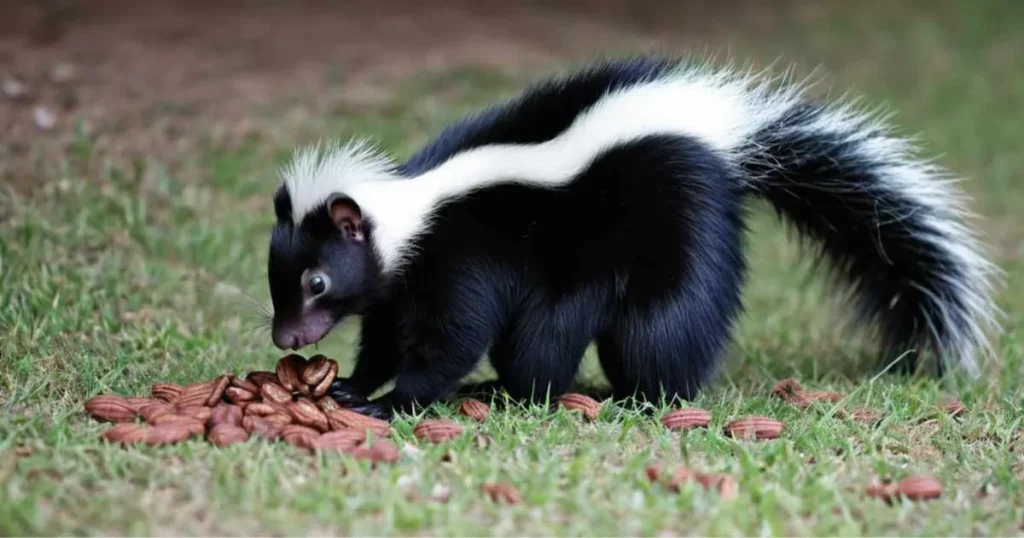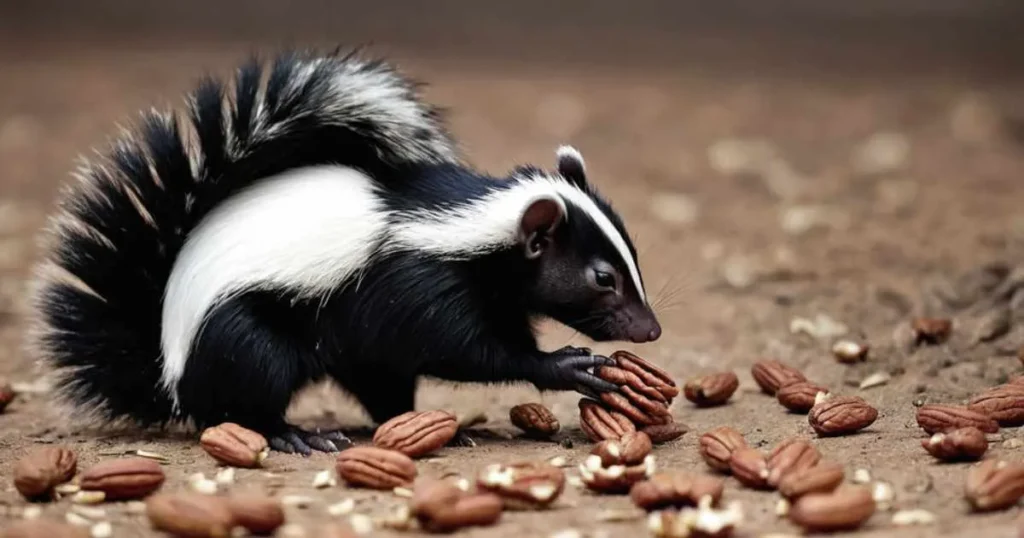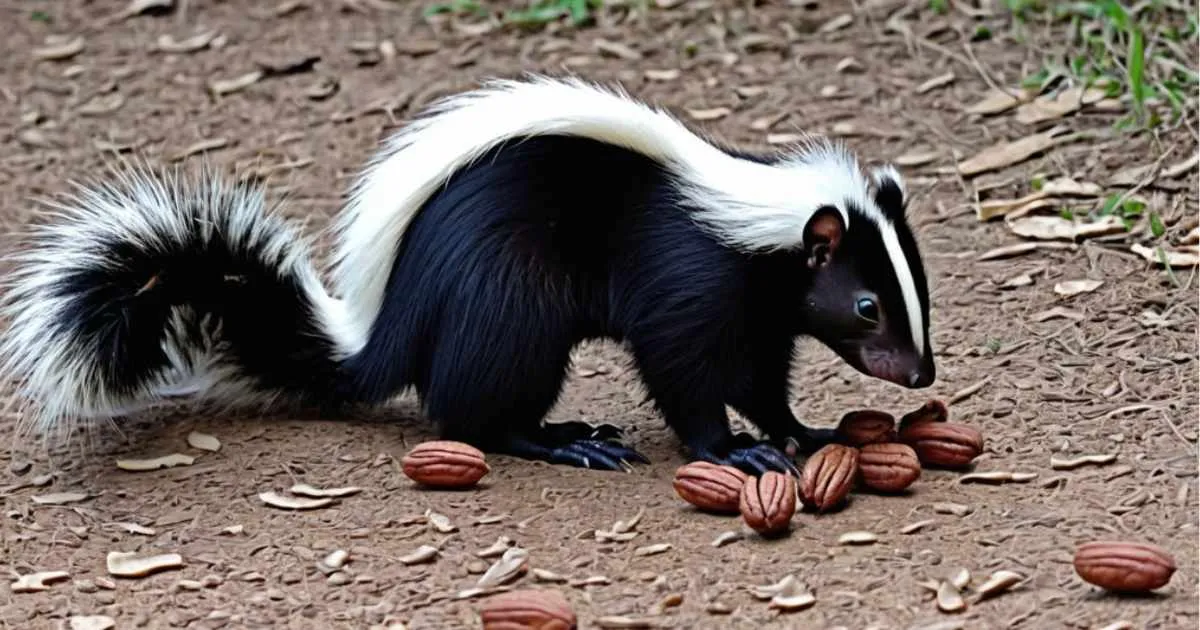Can Skunk Eat Pecans? Vet-Approved Facts & FAQ
Last updated on August 11th, 2024 at 07:33 am
As a skunk pet owner and wildlife enthusiast, I’ve learned some fascinating things about these unique animals, including their surprising love for pecans. Yes, skunks do eat pecans when they find them on the ground. These adaptable creatures have a varied diet that includes fruits, small mammals, insects, and vegetation. Pecans, with their high energy content, are a nutritious snack that skunks can’t resist. If you have a pecan tree in your yard, you might spot skunks foraging at night, drawn by their keen sense of smell. Understanding why skunks are attracted to pecans can help gardeners and homeowners manage their presence and reduce conflicts. Stick around to learn more about skunks’ eating habits and how to peacefully coexist with these interesting critters.
Skunks In Backyards
Wondering about your furry black and white visitors? Skunks, with their distinctive look and smell, are regular backyard guests. Some homeowners might be curious about their diets. Do skunks nibble on pecans they come across in our yards? Let’s delve deeper into skunk behavior and habitats to see what they enjoy eating.
Habitats And Dens
Skunks are adaptable creatures preferring to make homes near food sources. Your backyard could be the perfect habitat. Skunks build dens, often burrowing under decks, porches, or even shed foundations. When natural options are scarce, they might take shelter in brush piles or hollow logs.
- Safety from predators is key for skunk habitats.
- A backyard can provide ample hiding spots.
- Easy access to food makes your yard more attractive to them.
Foraging Behavior
Skunks are omnivores, meaning they eat both plants and animals. They forage at night, using their keen sense of smell to find food. Their diet includes insects, grubs, small rodents, and, yes, they do partake in pecans when available.
- Skunks will dig for grubs and insects.
- Fallen fruits and nuts like pecans are easy snacks.
- Garbage and compost bins attract skunks with food scraps.
In a nutshell, skunks can enjoy a good pecan as part of their varied diet. Proper waste management and yard maintenance can help discourage skunks from turning your backyard into their dining room.
Pecans Attracting Wildlife
Pecan trees provide more than just shade and beauty to your yard. Their nuts are like little magnets for various animals. If you believe that scrumptious treat disappears because of neighbor toddlers, think again! Chances are, furry visitors are the culprits. Let’s explore which mammals and birds consider your pecan tree as a drive-through restaurant.

Nutritional Value For Animals
Why are pecans desired by backyard friends? These nuts are packed with nutrients that animals crave. Proteins, fats, and carbohydrates in pecans make them a perfect snack. Wildlife from squirrels to skunks appreciates a high-energy diet and pecans deliver just that.
Check out the nutritional breakdown:
- Proteins: Essential for growth and repair
- Fats: Gives energy for daily activities
- Carbohydrates: Acts as a fuel source
Common Backyard Visitors
Your pecan tree does not only draw ‘nut’ aficionados of the air, such as woodpeckers and blue jays, but also four-footed snackers. A frequent sight might be squirrels scampering up the branches. At night, it’s the skunks that take their turn. Skunks indeed eat pecans! And let’s not forget about opossums and raccoons—true fans of your pecan bounty.
Here is a list of common pecan-loving wildlife:
| Animal | Attraction to Pecans |
|---|---|
| Squirrels | Can climb for pecans |
| Skunks | Forage on the ground |
| Raccoons | Great climbers and grabbers |
| Opossums | Enjoy fallen pecans |
| Birds | Peck open nut shells |
Skunk Diet Essentials
The diet of skunks is as intriguing as their notorious defense mechanisms. These mammals are opportunistic eaters. This means they will munch on a wide variety of foods. Understanding what skunks eat can help us coexist with these misunderstood creatures.
Omnivore Preferences
Skunks have a diverse palate, making them true omnivores. This allows them to adapt to different food sources available in their habitat.
- Fruits like berries and fallen apples
- Insects and grubs, which are protein sources
- Small rodents and amphibians for sustenance
- Eggs from ground-nesting birds
- Garbage and pet food, when accessible
Amidst this variety, one might wonder, do skunks eat pecans? Indeed, skunks will also include nuts like pecans in their diet, especially when other food sources are scarce.
Seasonal Eating Patterns
Skunks adjust their diets with the seasons. Here’s what they typically consume throughout the year:
| Season | Food |
|---|---|
| Spring | Insects, larvae, worms |
| Summer | Fruits, crops, small mammals |
| Fall | Nuts like pecans, acorns, berries |
| Winter | Scavenged remains, small rodents |
Skunks rely on their keen sense of smell to find food underground or hidden. They will eat more in the fall, including pecans, to bulk up for winter.
Nut Foraging And Skunks
Curious critters of the wild, skunks are often known for their potent smell. These explorative mammals also have a diverse diet, which includes various nuts such as pecans. We will uncover if nuts form a chunk of their dietary delights.

Search For Protein And Fat
Digging through leafy blankets on the ground, skunks are on a perpetual quest for nutrition. Nuts, like pecans, are packed with proteins and fats. These vital nutrients play a crucial role in a skunk’s diet, especially during the colder months. The high protein and fat content helps skunks stock up on energy and maintain their health.
Paw Dexterity And Nut Handling
Skunks showcase an impressive use of their paws when foraging. Agile and adept, their paws allow them to handle hard-shelled nuts with ease. While they do enjoy snacking on fallen pecans, skunks are not adept at cracking open tougher shells. They mostly rely on those already accessible, relying on their sense of smell to locate these buried treasures.
Do Skunks Eat Pecans?
Curious about whether skunks have a taste for pecans? These nocturnal creatures are known for their eclectic diet. Many wonder if these backyard visitors include pecans in their nightly forage. Let’s dig into the evidence and shared experiences to reveal the truth about skunks’ dietary habits.
Evidence Of Skunks Eating Nuts
Skunks are omnivores, meaning their diet includes plant and animal matter. While their favorite foods are insects and small mammals, skunks do not shy away from nuts when found. Research indicates that nuts can be a portion of their diet, especially when other food sources are scarce.
- Nuts provide essential fats and proteins.
- Skunks access nuts from the ground or low-hanging branches.
- Evidence includes nut shells found near skunk dens.
Anecdotes From Homeowners
Stories from homeowners offer insights into skunks’ eating habits. Instances of skunks eating pecans have been observed in various settings:
- Homeowners report finding half-eaten pecans on their property.
- Witness accounts of skunks rummaging through fallen nuts.
- Security footage sometimes captures skunks with nuts in their mouth.
| Observation | Frequency | Time of Year |
|---|---|---|
| Skunks eating pecans | Occasional | Autumn |
Deterring Skunks From Pecan Trees
Sweet, ripe pecans are a treat, not just for humans but also for pesky skunks. These nocturnal creatures may enjoy a feast in your garden at your expense. Skunks can cause trouble for pecan tree owners. Let’s explore how to keep these black and white critters away from your precious nuts.
Protective Measures For Trees
Secure the perimeter – A fence can guard your pecan trees. It should be buried a few feet into the ground. The mesh should be small enough to prevent skunks from entering.
- Steel or hardware cloth is ideal
- Ensure it stands at least 3 feet tall
Trim the branches – Skunks are not great climbers. Keep lower branches trimmed. This makes it harder for them to reach the pecans.
Clean the ground – Regularly pick up fallen pecans. Less food on the ground equals fewer skunks.
Safe Skunk Repellents
Repellents are a key line of defense. They can keep skunks at bay.
| Repellent Type | Description | Frequency of Use |
|---|---|---|
| Commercial sprays | Spray around your trees. Look for natural options that won’t harm the environment. | Follow the manufacturer’s instructions |
| DIY mixtures | Pepper, ammonia, or citrus can deter skunks. Create homemade sprays. | Apply every few days or after rain |
| Motion-activated devices | Lights or sprinklers startle skunks. They will avoid your garden. | Set them up and monitor for effectiveness |
Lights – Skunks dislike bright lights. Install motion-sensor lights near your trees.
Noise – A radio can work wonders. Play it softly at night to keep skunks away.
With these measures, your pecans stay safe. Skunks will need to look elsewhere for their snacks.
Impact Of Skunks On Pecan Harvest
Exploring the relationship between skunks and pecan harvests unfolds surprising facts. A pecan orchard stands as a treasure for these creatures. Let’s dig into how this relationship affects your pecan yield.
Potential For Crop Damage
Skunks often search for food in gardens and farms. Pecans, falling from trees, become easy targets. These mammals may claim a share of your harvest.
Skunks can pose a risk to pecan crops. Their foraging habits potentially lead to:
- Burrowing around trees that could damage roots
- Chewing on dropped pecans, reducing harvestable nuts
- Contesting with harvesters for the fallen bounty
Protecting pecans from skunks calls for effective strategies. Fencing and deterrents are common solutions.
Benefits Of Skunks In Gardens
It’s not all about damage, though. Skunks help gardens in several ways.
They contribute positively by:
- Eating harmful pests that attack pecan trees
- Aerating the soil with their digging habits
- Feeding on fallen fruit, thus limiting disease spread
Inviting skunks can offer a natural balance in your pecan garden. Balance crop protection with the benefits these creatures bring.
Living Harmoniously With Skunks
Did you know skunks may have a taste for your tasty pecans? Living harmoniously with skunks means understanding their behaviors and dietary preferences. Navigating this can ensure a peaceful coexistence with these black and white neighbors. Let’s dive into skunk behavior and how to create a balanced ecosystem right in your backyard.
Understanding Skunk Behavior
Skunks are omnivores, which means they eat both plants and animals. Their diet consists of fruits, insects, small mammals, and nuts, and yes, that includes pecans! Skunks are usually not aggressive, but they will spray a strong odor if they feel threatened.
These tips can keep both pecans and skunks safe:
- Secure trash cans: Keep lids tight to prevent skunks from scavenging.
- Avoid leaving pet food out: It attracts skunks and other wildlife.
- Use motion-activated lights: They can deter skunks from entering your property.
Creating A Balanced Ecosystem
Creating a space where skunks and humans can coexist requires a balanced ecosystem. This involves encouraging natural skunk predators and habitat management.
Follow these steps to balance your ecosystem:
| Action | Benefit |
|---|---|
| Maintain a clean yard | Reduces hiding spots for skunks |
| Plant deterrents | Natural smells can keep skunks away |
| Encourage natural predators | Owls and dogs can deter skunks |
Remember, skunks are part of the ecosystem and play a role in controlling pests. With a bit of knowledge and effort, you can enjoy your pecans and respect these nocturnal visitors.
Frequently Asked Questions
Yes, skunks do eat nuts as part of their varied diet, which also includes fruits, insects, and small rodents.
Skunks should avoid chocolate, caffeine, alcohol, onions, and garlic as they are poisonous to them. Unripe fruit, mushrooms, and salt can also harm skunks.
Skunks get attracted to yards with accessible food sources like garbage, pet food, and grubs. They also seek shelter under decks, porches, and brush piles.
Conclusion
Wrapping up, skunks have diverse diets, but pecans are typically not their first choice. While they might snack on these nuts occasionally, their foraging habits lean towards insects and smaller prey. Understanding this helps manage skunk visits to your garden and ensures your pecans stay safe for your own enjoyment.

